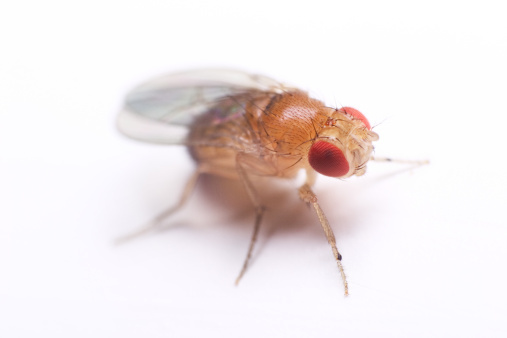A genetically engineered fruit fly may be an effective form of pest control, new research indicates.
The Mediterranean fruit fly is an agricultural pest that does extensive damage to more than 300 types of crops annually. This amounts to millions of tons of crops and billions of dollars lost globally.
Female Development Stunted
The genetically modified fly has a gene which interrupts female development, causing females to die before they can breed. Over the span of a few generations, colonies of flies die off.
An English company, Oxitec, created the modified fly. In greenhouse trials, the population of fruit flies collapsed over time, as there were no females left to produce the next generation of flies.
Previously, Oxitec had created genetically modified mosquitoes. In extensive Brazilian field trials, the new mosquitoes prevented the spread of dengue fever. Ninety-six percent of dengue-spreading mosquitoes were killed in the trials.
The new research on Mediterranean fruit flies was published in the Proceedings of the Royal Society B.
The next step for Oxitec will be open field trials. Governments would have to approve any release of genetically modified fruit flies into the general environment.
Activist Objections
Environmental activists have protested the development and use of bioengineered organisms, including Oxitec’s flies, asserting the release of genetically modified flies into the wild could have unintended consequences.
Oxitec, however, notes the flies have already been extensively tested with no evidence of negative effects. Adverse effects are unlikely because only males survive. As genetically modified female flies are no longer released, they are quickly removed from the gene pool.
Environmental Benefits
Gregory Conko, executive director of the Competitive Enterprise Institute, argues history demonstrates the safety and efficacy of such genetic modification.
“We’ve now been genetically engineering cell lines and microorganisms to produce pharmaceuticals for 40 years. We’ve been engineering laboratory animals for 35 years. And we’ve been engineering crop plants for 30 years. The technology has been studied extensively, and it has been proven to be safe – oftentimes safer than the conventional breeding it replaces,” Conko said.
Biotechnology benefits the environment, he explained.
“Just as engineered crop plants let farmers use less pesticides and herbicides—which has real benefits for the environment—genetically engineering fruit flies will be vastly better for people and the environment than spraying chemical insecticides, said Conko.
Dennis Avery, director of the Center for Global Food Issues at the Hudson Institute, said anti-human sentiment, rather than a concern for human welfare, motivates objections to genetically modified organisms.
“Oxitec is pioneering a whole new phase of food productivity and human health,” Avery said. “They’re already using it on Brazilian mosquitoes to suppress dengue fever. The Greens are appalled at more people living long and well. Fortunately, human numbers are already set to turn downward after 2060, even without the Greens’ callous strategy of spreading famine and pestilence.”
H. Sterling Burnett ([email protected]) is managing editor of Environment & Climate News.
Additional Info “Genetic elimination of field-cage populations of Mediterranean fruit flies,” Proceedings of the Royal Society B, August 23, 2014, http://heartland.org/policy-documents/genetic-elimination-field-cage-populations-mediterranean-fruit-flies





